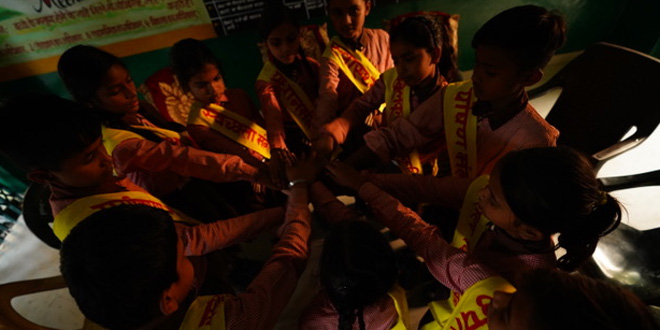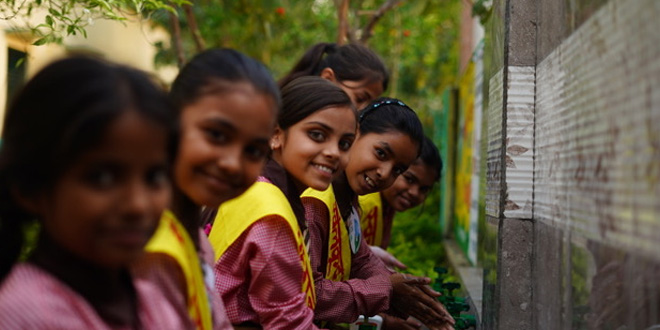New Delhi: “I wish every child knows the basics of handwashing. Over the years, I have realised the importance of following a healthy routine like washing hands before and after eating food, before and after using a toilet,” says 11-year-old Aman Patel, who is a Class 5 student in Varanasi’s Prarthmik Vidyalaya Sihorva.
Another student from the same school, Aastha Patel adds,
Since the time, we have started following the hygiene routine, I have not fallen ill. We have learned the importance of following hygiene routine on a day-to-day basis.
When team Banega Swasth India asked these students how did they learn about these healthy practices they responded,
This is courtesy Bajegi Ghanti, Dhulega Hath curriculum that has been implemented in our school as a part of Dettol Banega Swasth India Hygiene Curriculum. As part of the curriculum, during recess time, our school rings the bell six times. This is our signal to come out of our classrooms and follow the six-step routine of handwashing.
The students of this school are part of thousands of other students in many different schools of Varanasi, who are reaping the benefits of the Dettol Banega Swasth India Hygiene Curriculum that aims to make children aware of how and when to wash their hands. In these schools all the students have access to basic things like soap, water stations – a critical intervention in a country where diarrhoea is a leading cause of mortality in children under 5.
Talking about the impact of the programme in Varanasi, Skand Gupta, Block Minister of Education, Chiraigaon, Varanasi said,
In 2016, this was launched as a pilot project in the state in mere 100 schools. This number has now increased to around 1000 schools and the programme is impacting around 1.5 lakh students. We have seen a lot of positive changes in the society, the instances of absenteeism in school have drastically reduced.
Explaining how the programme has been implemented with a 360-degree approach, he further said,
The programme helped train the staff of these schools, wherein they taught the teachers on how they can impart the hygiene lessons in fun and interesting ways so that students follow it diligently. With school students learning the basics of hygiene, we saw the message traveling to the society as they started taking the good habits back at home and forcing their families to follow the Swasth routine.
Highlighting the importance of programmes like Dettol Banega Swasth India, a school teacher, Neelam Rai said,
The main benefit of the programmes like Dettol Banega Swasth India curriculum is that it helps embed good habits at an very early stage. Children have the potential to change and impact the lives of a generation growing up. They can help spread the word of hygiene in the society, at their home, teach the younger generation and even to their friends, who are not studying in the school. This way, a larger section of people can be made aware of simple basic hygiene things and together we can help build a healthier society.
More About Dettol School Hygiene Curriculum
The initiative started back in 2014 with the launch of the curriculum in just 2,500 schools. Today, it has reached out to 24 million children across 840,000 schools and 500,000 Madrasas.
The curriculum has been revolutionising the understanding and practice of hygiene through impactful, innovative interventions like:
– Hygiene Buddy Kits that enable experiential learning and ignite STEM (Science, Technology, Engineering, and Mathematics) thinking. These kits include fun games for kids like “Soapy Play Dough” and “Learning How Germs Spread” and stimulate learning through Neuro Linguist Programming (NLP).
– Teaching the science of hygiene through comic books, to engage with children through their favourite and loved characters like Chacha Chaudhary and Sabu
– Building Hygiene Play Parks, which is a one-of-its- kind initiative that uses play pedagogy to drive behaviour change. It instils crucial hygiene awareness in an environmentally-friendly way
– Setting up hygiene corners in every school, with prominent displays of the material needed for hygiene, such as soap, hand-wash, buckets, water mugs, towels, students’ workbooks, the teacher’s manual, posters, a first-aid box and more. The aim of hygiene corners is to keep students informed about the ‘how and why’ of hygiene
NDTV – Dettol have been working towards a clean and healthy India since 2014 via the Banega Swachh India initiative, which is helmed by Campaign Ambassador Amitabh Bachchan. The campaign aims to highlight the inter-dependency of humans and the environment, and of humans on one another with the focus on One Health, One Planet, One Future – Leaving No One Behind. It stresses on the need to take care of, and consider, everyone’s health in India – especially vulnerable communities – the LGBTQ population, indigenous people, India’s different tribes, ethnic and linguistic minorities, people with disabilities, migrants, geographically remote populations, gender and sexual minorities. In wake of the current COVID-19 pandemic, the need for WASH (Water, Sanitation and Hygiene) is reaffirmed as handwashing is one of the ways to prevent Coronavirus infection and other diseases. The campaign will continue to raise awareness on the same along with focussing on the importance of nutrition and healthcare for women and children, fight malnutrition, mental wellbeing, self care, science and health, adolescent health & gender awareness. Along with the health of people, the campaign has realised the need to also take care of the health of the eco-system. Our environment is fragile due to human activity, which is not only over-exploiting available resources, but also generating immense pollution as a result of using and extracting those resources. The imbalance has also led to immense biodiversity loss that has caused one of the biggest threats to human survival – climate change. It has now been described as a “code red for humanity.” The campaign will continue to cover issues like air pollution, waste management, plastic ban, manual scavenging and sanitation workers and menstrual hygiene. Banega Swasth India will also be taking forward the dream of Swasth Bharat, the campaign feels that only a Swachh or clean India where toilets are used and open defecation free (ODF) status achieved as part of the Swachh Bharat Abhiyan launched by Prime Minister Narendra Modi in 2014, can eradicate diseases like diahorrea and the country can become a Swasth or healthy India.




















